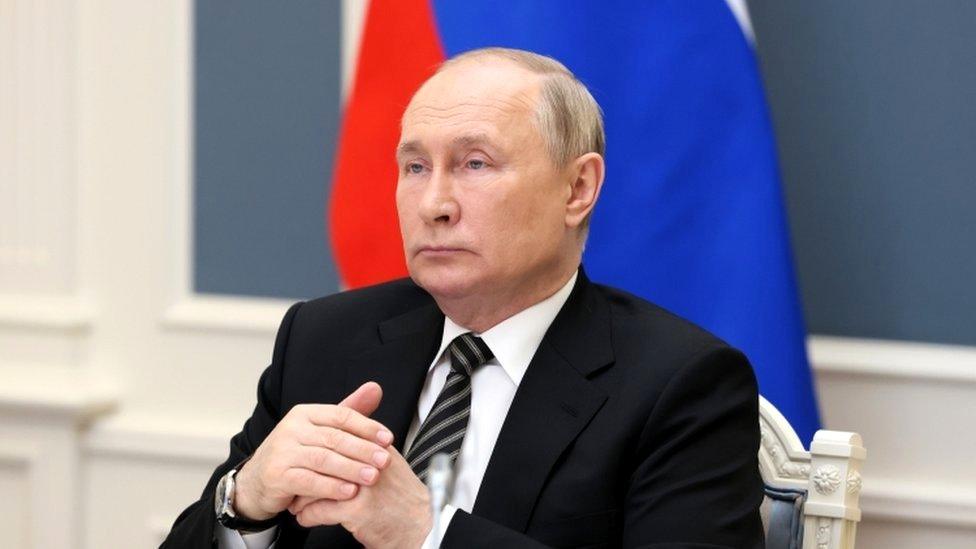War in Ukraine: Wounded but eager to go back to fight
- Published
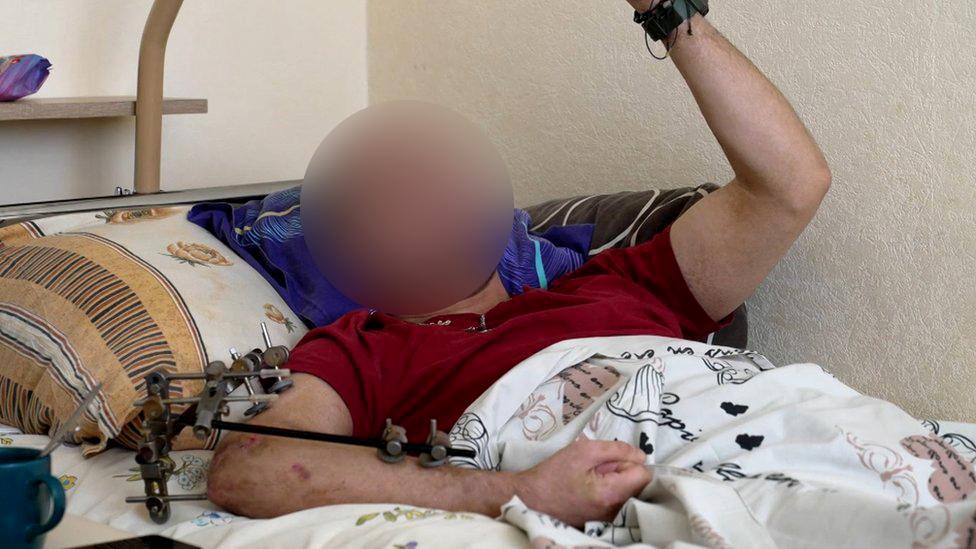
21-year-old Yuri was wounded in a rocket attack.
Yuri has lost his foot, but not his will to fight.
He narrowly survived a shell blast. His Sergeant Major was killed on the spot.
Yuri managed to warn his brothers-in-arms to take cover, but did not make it himself. He was 10 metres away from shelter when the rocket hit.
"I was at the very epicentre of that strike," he tells me from his hospital bed in Dnipro, four hours from the frontline in the Donbas region in the east of Ukraine.
"If it was up to me, I would stand up right now and go fight. I am really upset that my guys are fighting there, and I am just lying here, unable to help," he says.
Fiery words, but Yuri is pale. His right arm is held together by metalwork to repair the bone. The surgeons tried to save his left foot, but they say the damage was too great.
This 21-year-old will need a prosthetic foot if he is to get his wish and fight again for his country.
But right now, there is a long line of those in need - both injured soldiers and civilians.
"Ukraine needs more help to purchase prosthetic components," says Yevhen Chehlakov from the Foundation for Social Protection of Persons with Disabilities.
"The country's budget in this area was allocated before the war and did not foresee this. One of our top priorities is to restore the lost functions of the wounded as soon as possible and return them to full life," he adds.
It is difficult to get the scale of the problem. We asked Ukraine's Ministry of Defence to comment but they did not reply.
The hospital in Dnipro is the closest to the frontline, but doctors here are instructed not to tell us how many wounded soldiers they are treating.
Our visit is closely monitored by a press officer and we are restricted from asking any questions about civilian casualties or deaths.
'It's hell out there'
President Zelensky said last week that up to 100 Ukrainian soldiers are dying in combat every day, with about 500 more wounded.
Surgeons and paramedics say the majority suffer from blast wounds.
The Pirogov First Volunteer Mobile Hospital team are often first to treat soldiers wounded on the frontline in the Donbas region.
"It's hell out there," Hennadiy Druzenko from the group tells me.
"Unlike what we saw in the Kyiv region, there are almost no gunshot wounds - just horrendous mutilating injuries inflicted by shells, mortars, bombs, and grenades. It's horrifying how the technology of killing has advanced."
"I see patients with terrible trauma," says Professor Oleksandr Loskutov from the National Academy of Medical Sciences of Ukraine.
He is an orthopaedic surgeon in Dnipro, working around the clock to save as many people as he can. Some days, he sees up to 80 patients.
"Not everyone can be saved," he says quietly. But he believes that a solution for those who have lost limbs must be found within the country, not by sending patients to hospitals abroad.
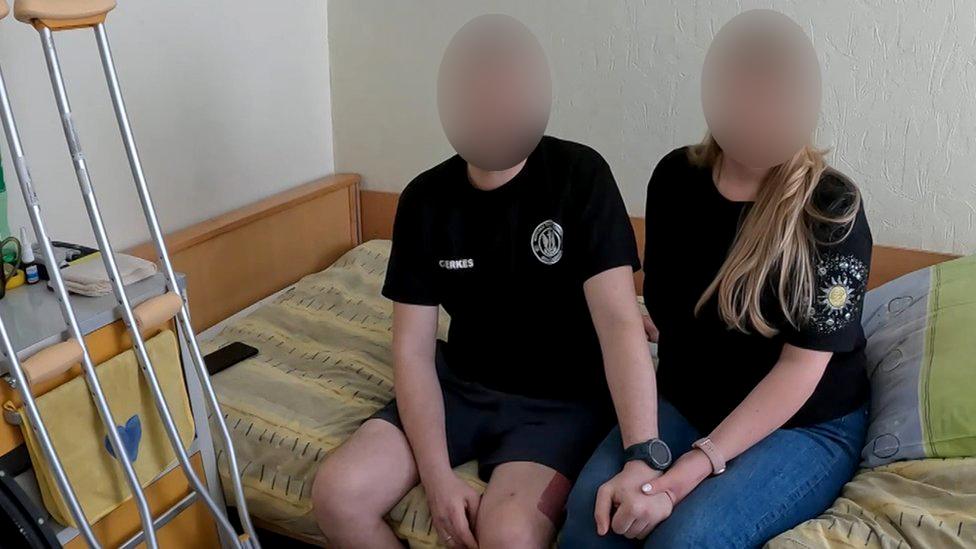
Surgeons were able to save Serhei's wounded leg thanks to a difficult procedure.
We visit a prosthetics factory in Dnipro built in 1944. Here, they are ready to increase production.
"The person receiving their first prosthetic limb has to be trained in using it. It's like with bicycles: it's not enough to just give someone a push bike for them to ride it. Someone has to provide training somewhere," says the director Oleksii Shtanko, as he gives me a tour.
"When someone gets admitted into our in-patient care and sees that there are others missing both legs or an arm, just like them, they see that life carries on. You can have a normal life with what modern technologies have to offer," he adds.
There are also incredible success stories: surgeons' skills are saving limbs.
Serhiy was hit by a mortar during a mission in Mariupol - a city which now lies in ruins and in Russian hands.
I was shown the slides of Serhiy's injury. Most of his lower leg was gone, but the surgeons used parts of his thigh to rebuild it.
"The chances were slim," he tells me.
His wife Yulia hadn't heard from him for two weeks when she got the call to come to the hospital.
She keeps hold of his hand throughout the interview. She only lets go once, as Serhiy uses his crutches to show me he can walk very short distances.
"It's a miracle," Yulia says.
But like Yuri, her husband can only think of getting back to the fight. Serhiy believes military rehabilitation rooms across Ukraine will be full of frustrated soldiers like him.
I ask Yulia what she thinks about that.
"I support my husband totally. I am ready to move on and support everything that he is going to do," she tells me, still holding Serhei's hand.
The toll taken by this war is matched by a strong will to overcome its effects. Many charities and organisations are ready to help.
But it will take money and time, to ensure another cruel conflict does not haunt yet another generation of soldiers.
Related topics
- Published3 June 2022
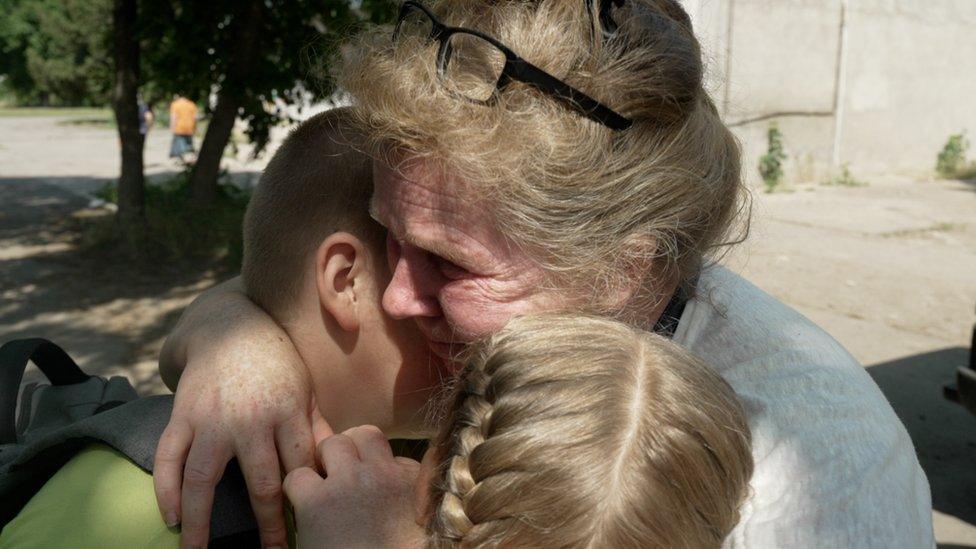
- Published26 May 2022
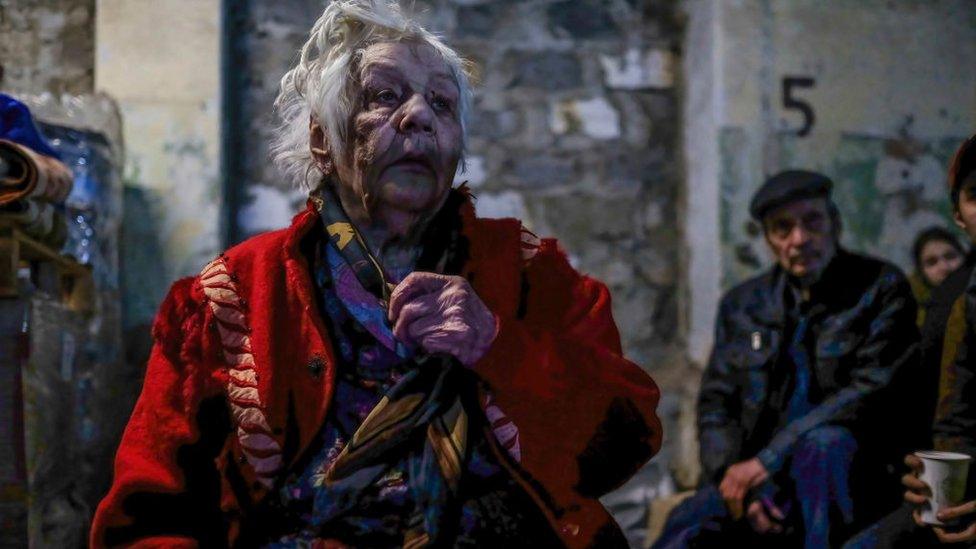
- Published3 June 2022
